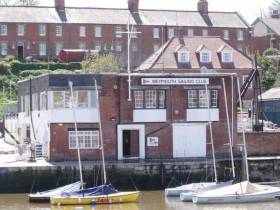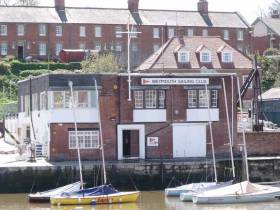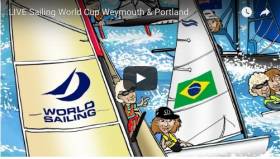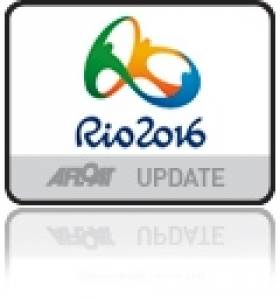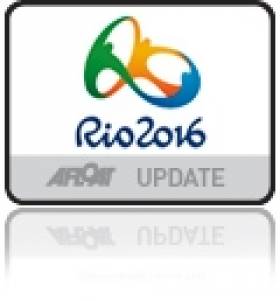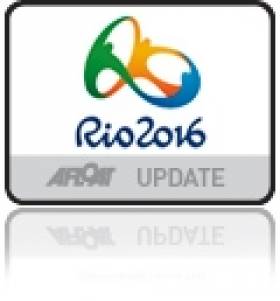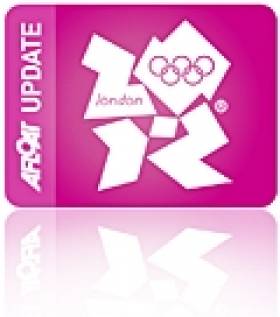Displaying items by tag: Weymouth
Man Crushed To Death By Yacht ‘Made Cradle Unstable’ During Maintenance, Inquest Hears
An inquest into the death of company director Kevin Keeler, who was crushed while working on his boat in Weymouth a year ago, has heard that he had made the boat’s cradle unstable while painting the bottom of its hull.
As previously reported on Afloat.ie, the 56-year-old was crushed by the half-ton yacht in a Weymouth boatyard on 16 April 2018.
Keeler had been a member of Weymouth Sailing Club since the previous year with his partner Tatiana Saltykova and had purchased the 29ft yacht Ginny Kwik that Christmas, according to Mail Online.
The yacht was lifted out for maintenance in March 2018 and Wheeler, an electronics engineer, borrowed a cradle from a fellow sailor to carry out the work.
However, the inquest heard that he had made this cradle unstable when he lowered one of its supporting props to reach the underside of the hull, which caused the vessel to collapse on top of him.
Another man on a nearby slipway told the inquest how he heard a ‘loud crash’ as the boat fell in his direction — and how he attended to the fallen Wheeler whose condition deteriorated quickly before paramedics arrived.
Mail Online has more on the story HERE.
Man Crushed To Death By Yacht While Making Repairs
A man has died after he was crushed by the half-ton yacht he was working on in a Weymouth boatyard, as Mail Online reports.
The 56-year-old, believed to be a company director, was carrying out repairs on his 29ft sailing yacht yesterday (Monday 16 April) in advance of the summer sailing season when the boat suddenly fell over.
“The man in question was a full member of the sailing club and he joined last summer,” Weymouth Sailing Club Commodore Euan McNair said in a statement. “He was coming up to a year of membership and it’s tragic what has now happened.”
The incident occurred at a time when many boats are being worked on and lifted back into the water around Britain and Ireland ahead of the summer season.
Mail Online has more on the story HERE.
Live Medal Races at Sailing World Cup, Weymouth Click HERE!
Watch Ireland's 49er Ryan Seaton and Matt McGovern live in the Medal Races at Sailing World Cup Weymouth and Portland today. Racing will be broadcast live (below) today (Sunday 12 June) from 11:00 to 16:00 BST / local time, 10:00 to 15:00 UTC on Afloat.ie
The Live Medal Race schedule, in BST, local time, is as follows:
Schedule
11:00 - Sailing World Cup Weymouth & Portland Medal Race show begins
11:10 - Men's 470
11:50 - Finn
12:30 - Laser
13:10 - Laser Radial
13:50 - 49er
14:25 - 49erFX
15:00 - Nacra 17
15:30 - Women's 470
16:00 - End of show
New VX One 2015 UK Nationals at Weymouth Sailing Club
The UK’s second ever VX One National Championship gets underway from 2 - 4 October at Weymouth Sailing Club. With boats travelling from as far afield as Ullswater, Edinburgh and the West Country, a good forecast and the sailing taking place on Weymouth Bay’s Olympic waters, the event is promising some thrilling and highly competitive, one-design racing.
The lively VX One, which has strong fleets in the USA and Australia, is already catching the eye of many top UK sailors. Last year’s Nationals saw the likes of Peter Barton and Olympian Stevie Morrison try their hand in the class, with more newcomers this year. Former Enterprise and OK World Champion, Jim Hunt will be making his debut in the fleet, along with Adrian Peach the SB20 Cowes Week Grand Slam champion.
Current VX One Inland Champions, and former International 14 stalwart, Howard Steavenson, sailing with son Tom, are racing as one of the fleet favourites for the Championship title.
Recently described as “The best one design ever!” by five times 505 World Champion, Wolfgang Hunger, and the “One of the most exciting new Sportsboats to hit the scene” by Yachting World’s Matt Sheahan, and with full support from the Ovington Boats team on shore, we can look forward to some exciting sailing over the next three days.
Annalise Takes Fifth At ISAF World Cup in Weymouth
#isaf – Fifth overall for Annalise Murphy including medal race participation in the Laser Radial class of the ISAF World Cup in Weymouth today will be of some satisfaction for the Dun Laoghaire sailor given the very light winds encountered this morning. The odds were heavily stacked in Marit Bouwmeester's (NED) favour after a commanding week of racing. She held a 15 point advantage over Evi Van Acker (BEL) and only a near disaster could have seen her knocked off her perch. She sailed well, finishing fourth which was more than enough for gold.
"It has been a really good week for me," commented Bouwmeester. "I had some steady results and I was happy to take it in today during the Medal Race.
"I had five first places and two seconds and that was my best scorecard ever, so I am very pleased with that, that's results wise but todays sailing was a little less brilliant and still a lot to work on."
Van Acker took the Medal Race victory to confirm silver.
The race for bronze was little bit more tense with plenty of equations possible including Annalise. Alison Young (GBR) held the spot overnight however a great performance from Anne-Marie Rindom catapulted her into bronze. Rindom's second enabled her to remove Young who managed a seventh. Annalise never threatened in the medal race and appeared sluggish especially downwind in conditions as low as four knots at times. She ended the race ninth of ten starters.
#isafworldcup – A satisfying medal race finish is in store this morning at 11.45 for Annalise Murphy whose hard work paid off yesterday when she took a 9,1,5 to be fourth overall and four points off the Bronze medal position currently held by Britian's Alison Young.
The positions for this morning's live Medal Races have been decided following an intense day of competition at ISAF Sailing World Cup Weymouth and Portland yesterday.
After Friday only served up a race apiece for the Men's RS:X and 470, Saturday was always going to be a hard day with an additional race for each fleet added.
A 13-17 knot breeze coupled with a lumpy sea state tested the competitors with the leader boards fully shaped for the live Medal Races which will be available to view here from 11:00 local time
The Irish Sailing star will be hoping to move up one place and improve on her Olympic sailing Regatta result three years ago. Critically though, the forecasted breeze is only 8 knots from the north-west, potentially leaving Annalise without her heavy air boat speed advantage.
Marit Bouwmeester (NED) has been head and shoulders above her 35 other rivals in the Radial.
From seven races Bouwmeester counts five bullets and two seconds, an outstanding collection of results that has only been bettered by Great Britain's Helena Lucas (GBR) in the Paralympic 2.4mR event.
Bouwmeester was unlucky not to make it a clean sweep of race victories on the penultimate day of racing. She took the first race victory with a certain degree of comfort, finishing 19 seconds ahead of Anne Marie Rindom (DEN).
In the next race she took an early lead but relinquished the spot to Annalise who finished 19 seconds ahead. Bouwmeester led the third and final race of the day from the beginning but was passed by Evi Van Acker (BEL). Very little separated the pair as the race played out and the Belgian took the bullet by just seven seconds.
#roadtorio – Olympic class sailors including Irish Olympic campaigns will return to the London 2012 sailing venue in June this year. The ISAF Sailing World Cup will be held at the Weymouth & Portland Sailing Academy (WPNSA) 8 – 14 June 2015, organised by the Royal Yachting Association (RYA).
Over 450 of world's top sailors in all ten of the Olympic sailing Classes and the three Paralympic classes will be battling it out on the courses on Weymouth Bay and Portland Harbour in June for places in ISAF Sailing World Cup Final in Abu Dhabi 27 October – 1 November 2015.
The line up includes 24 Olympic medallists from around the world who will return to the 2012 Olympic venue in the run up to Rio 2016. The entry list includes the British Sailing Team's only returning Gold medal winner, Helena Lucas MBE, who scooped Paralympic Gold in the 2.4mR class and has recently been named as the first British athlete to be selected for ParalympicsGB for Rio 2016.
Stephen Park, British Sailing Team Manager explains: "The ISAF Sailing World Cup has undergone a transformation this season to become a more elite invitation-only event with just 40 of the very best crews in each of the Olympic classes battling it out for event honour and a place the World Cup Final in Abu Dhabi. The Weymouth and Portland event will also see elite Paralympic Classes sailors plus some top kiteboard racers in action.
"We're delighted to welcome the world's best sailors back to our home in Weymouth and Portland for what I'm sure will be high quality event with hopefully lots of home support for our British Sailing Team stars. The new World Cup format complete with live medal race TV coverage, plus the RYA's plans for a World Cup Race Village in the venue will provide a fantastic showcase for our sport and our Rio 2016 medal hopefuls. We hope to see you there!"
The RYA won the bid to host one of two European legs of the ISAF Sailing World Cup at the British Sailing Team's training base at the Weymouth and Portland National Sailing Academy. The team know these waters well and expectations are high for the athletes. Sailors must qualify to take part in the event based on performance and rankings from the previous legs.
The British squad so far includes 15 veterans of London 2012. The British competitors boast an impressive Olympic / Paralympic medal haul of one Gold, three Silver and three Bronze medals between them from previous Games. Along with the Olympic vets, Giles Scott will be competing in the Finn Class, looking to continue his winning streak and Nick Thompson in the Laser Class will be aiming to upgrade his recent Silver medal wins in the Hyeres and Miami events.
Park continued: "We are on home waters so clearly we want to put on a good show.. The global competition will be fierce as many of the country teams use the ISAF Sailing World Cup events as part of their selection processes towards Rio."
Spectators are invited to WPNSA to watch the racing and get up close to the sailors during the event. You can watch the progress on the live tracking system, follow the action on the live blog and on live streamed TV from the courses on the Medal Race Day (Sunday 14th June).
Admission to ISAF Sailing World Cup Race Village is free, and as well as the sailing action there will be a host of shore-side activities and opportunities for the whole family.
#SailforGold – Irish Olympic sailing campaigners are off to a mixed start in Weymouth today with Annalise Murphy lying 12th in Sail for Gold regatta after a single race today. "Seven hours on the water for one race today. Frustrating but at least it wasn't raining! Hopefully some more races tomorrow, Annalise tweeted this evening.
Also sailing the radial this week are a batch of Irish youth sailors who finished the race ahead of Annalise, one after another in the 31-boat fleet; Darragh O'Sullivan finished sixth, Cian Byrne seventh, Fionn Lyden eighth, Finn Lynch ninth and Seafra Guilfoyle tenth.
Ireland's 49er pairing Ryan Seaton and Matt McGovern are back in action for the first time since London 2012 are sixth after three races. The two new 49erfx Irish girls teams are at the back of the 8–boat fleet. Andrea Brewester and Claudine Murphy are seventh and Tiffany Brien and Saskia Tidey are eighth.
James Espey was 17th in his 31–boat Laser fleet
Annalise Sails for Three Out of Three as Irish Sailors Head for Sail for Gold, Weymouth
#SailforGold– Irish Olympic Sailing sensation Annalise Murphy is back in Weymouth to make it three out of three in the Eurosaf Champions Sailing Cup series after already taking gold at the first two events in Italy and Holland.
She is joined by four of her London 2012 Olympic team mates this weekend to begin competing at the Sail for Gold Regatta. Murphy (Laser Radial) is joined by Ryan Seaton and Matt McGovern (49er) and James Espey (Laser) will begin racing on Sunday in what will be the third of five EUROSAF installments
This will be the first regatta of the 2013 season for Seaton and McGovern who finished 14th overall at the Games last year. Back in familiar waters after months of physical and mental training, the duo are eager to once again feel the adrenaline of elite competition as they begin their campaign towards the Rio 2016 Olympics. Up against some of the top international 49er teams, the Northern Irish men will be looking to shake off the cobwebs after an extended break from competition.
Also campaigning for the Rio Games and competing for the first time in the 49er FX class will be two new all-female pairings. Claudine Murphy, older sister of Annalise, has teamed up with Andrea Brewster while Tiffany Brien and Saskia Tidey, will be sailing the other Irish entry for the new Olympic class.
British Sailing Academy at Weymouth Enhances Business
#olympic sailing – The Weymouth and Portland National Sailing Academy is primarily renowned for its status as an Olympic sailing venue and was described by Seb Coe as 'the ultimate water sports venue'. Now following up on the great success of the British Business Pavilion held at the Qinetic site at Bincleaves during the Olympic sailing events, the Academy is also providing an iconic setting for a wide range of business events.
Weymouth and Portland Chamber of Commerce know the value of hosting events at the venue and have described the Academy as "an outstanding place to create business and showcase Dorset as a fantastic place to visit."
The Academy is able to cater for seminars or meetings of up to 200 people in the 'Spinnakers Room' and has a series of smaller rooms suitable for between 10 and 70 people. With locally sourced catering and very extensive free car parking, the Academy provides a unique local opportunity to have that special business meeting and networking in an Olympic venue with all the associated values of excellence, respect and friendship. The main rooms have a stunning view of the Jurassic Coast with an extensive balcony overlooking the race areas and Dinghy Park. A range of water sports can also be arranged to form part of the programme if required, so that a real team building event can be delivered.
Furthermore, having won a series of very prestigious awards, the venue is rightfully proud of its environmental credentials. It is one of the few venues to have achieved accreditation under International Standard ISO 20121 for its sustainable management system for events – a standard developed for the 2012 Games and now being implemented internationally.
Mike Rundle from UKTI South West believes that WPNSA can add the wow factor to any business meeting or event: "The Weymouth and Portland National Sailing Academy in Portland stands unique in UK sport being one of the few Olympic venues that will continue to be used as a National Sports Centre post the 2012 Games. The view of other national teams who used the facilities in both the run up to 2012 and during the competition was overwhelming in the opinion that Weymouth and Portland represents the best designed facilities for competition sailing in the world and is a model for any Sailing Federation seeking to develop their own National Academy.
As a venue it is unrivalled in its setting. Majestic on days with bright blue skies, broody and daunting in stormy weather, the Academy delivers on so many different levels, contributing drama and character to any event being held in its flexible and impressive reception rooms. Little more than a decade since it opened its doors in 2000, the Academy has already absorbed the tradition of British sailing history and possesses that indefinable sense of presence which adds to the atmosphere.
WPNSA rightly holds a unique and special place in Dorset making it the pre-eminent venue for any business conference to be held in the region and UKTI views the Academy as the only place we wish to hold our events in the area due to the international pedigree and facilities the Academy offers us."


























